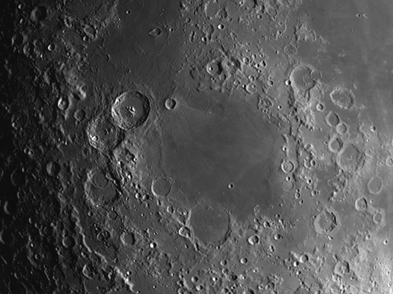The week of May 30-June 5 takes us from New Moon to Day 6. This week we will highlight the moon crater Mare Nectaris, viewable on Saturday evening, Day 5.
 Mare Nectaris: [SE/L13] The Nectaris basin was excavated 3.9 billion years ago. The oldest features on the Moon formed prior to this event. Mare Nectaris is a classic example of a multi-ring basin. Sunday evening will reveal the attendant Rupes Altai, a high cliff that is a conspicuous fragment of one of the original rings. As the Sun rises over the region, try to locate hints of other ring features surrounding Mare Nectaris.
Mare Nectaris: [SE/L13] The Nectaris basin was excavated 3.9 billion years ago. The oldest features on the Moon formed prior to this event. Mare Nectaris is a classic example of a multi-ring basin. Sunday evening will reveal the attendant Rupes Altai, a high cliff that is a conspicuous fragment of one of the original rings. As the Sun rises over the region, try to locate hints of other ring features surrounding Mare Nectaris.
======================
It is highly recommended that you get a copy of Sky and Telescope’s Field Map of the Moon, the very finest Moon map available for use at the telescope. It is available for $10.95 at www.skyandtelescope.com and on Amazon. All features mentioned in this blog will be keyed to the grid on the Field Map and will look like this: Plato: [NW/D9]
Credits:
Courtesy of Gray Photography of Corpus Christi, Texas
Lunar photos: NASA / USGS / BMDO / LROC / ASU / DLR / LOLA / Moon Globe. Used by permission
- Trio of Moon Craters with Distinct Personalities - April 22, 2024
- Hippalus Rilles on the Moon - April 15, 2024
- Moon Crater Janssen: How New Moon Craters are Superimposed on Top of Older Craters - April 8, 2024